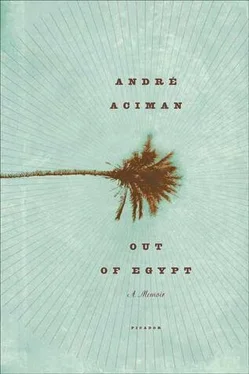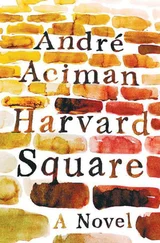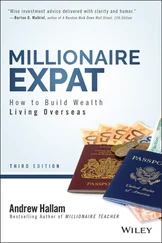André Aciman
Out of Egypt: A Memoir
I wish to thank Neal Kozodoy, whose help, devotion, and time were invaluable; Sara Bershtel, to whom I owe this book; and my wife, Susan, to whom I owe everything.
For Alexander, Michael, and Philip,
Henri and Régine,
Alain and Carole,
and Piera
1. Soldier, Salesman, Swindler, Spy
“So, are we or aren’t we, siamo o non siamo ,” boasted my Great-uncle Vili when the two of us finally sat down late that summer afternoon in a garden overlooking his sprawling estate in Surrey.
“Just look at this,” he pointed to a vast expanse of green. “Isn’t it splendid?” he asked, as if he had invented the very notion of an afternoon stroll in the English countryside. “Just before sundown and minutes after tea, it always comes: a sense of plenitude, of bliss almost. You know — everything I wanted, I got. Not bad for a man in his eighties.” Arrogant self-satisfaction beamed on his features.
I tried to speak to him of Alexandria, of time lost and lost worlds, of the end when the end came, of Monsieur Costa and Montefeltro and Aldo Kohn, of Lotte and Aunt Flora and lives so faraway now. He cut me short and made a disparaging motion with his hand, as if to dismiss a bad odor. “That was rubbish. I live in the present,” he said almost vexed by my nostalgia. “Siamo o non siamo?” he asked, standing up to stretch his muscles, then pointing to the first owl of the evening.
It was never exactly clear what one was or wasn’t, but to everyone in the family, including those who don’t speak a word of Italian today, this elliptical phrase still captures the strutting, daredevil, cocksure, soldier-braggart who had pulled himself out of an Italian trench during the Great War and then, hidden between rows of trees with his rifle held tightly in both hands, would have mowed down the entire Austro-Hungarian Empire had he not run out of bullets. The phrase expressed the hectoring self-confidence of a drill sergeant surrounded by sissies in need of daily jostling. “Are we man enough or aren’t we?” he seemed to say. “Are we going ahead with it or aren’t we?” “Are we worth our salt or what?” It was his way of whistling in the dark, of shrugging off defeat, of picking up the pieces and calling it a victory. This, after all, was how he barged in on the affairs of fate and held out for more, taking credit for everything, down to the unforeseen brilliance of his most hapless schemes. He mistook overdrawn luck for foresight, just as he misread courage for what was little more than the gumption of a street urchin. He had pluck. He knew it, and he flaunted it.
Impervious to the humiliating Italian defeat at the Battle of Caporetto in 1917, Uncle Vili remained forever proud of his service to the Italian army, flaunting that as well, with the spirited Florentine lilt he had picked up in Italian Jesuit schools in Constantinople. Like most young Jewish men born in Turkey toward the end of the century, Vili disparaged anything having to do with Ottoman culture and thirsted for the West, finally becoming “Italian” the way most Jews in Turkey did: by claiming ancestral ties with Leghorn, a port city near Pisa where escaped Jews from Spain had settled in the sixteenth century. A very distant Italian relative bearing the Spanish name of Pardo-Roques was conveniently dug up in Leghorn — Vili was half Pardo-Roques himself — whereupon all living “cousins” in Turkey immediately became Italian. They were all, of course, staunch nationalists, monarchists.
When told the Italian army had never been valiant, Uncle Vili had immediately challenged an Alexandrian Greek to a duel, especially after the latter had reminded him that all those Italian medals and trinkets hardly altered the fact that Vili was still a Turkish rascal, and a Jewish one to boot. This infuriated Uncle Vili, not because someone had impugned his Jewishness — he would have been the first to do so — but because he hated to be reminded that many Jews had become Italian through shady means. The weapons their seconds had chosen for the occasion were so obsolete that neither of the two duelists knew how to wield them. No one was hurt, apologies were made, one of them even giggled, and, to foster a spirit of fellowship, Vili suggested a quiet restaurant overlooking the sea, where on this clear Alexandrian day in June everyone ate his heartiest luncheon in years. When it came time for the bill, both the Greek and the Italian insisted on paying, and the tug-of-war would have gone on forever, each alleging his honor and his pleasure, had not Uncle Vili, like a conjurer finally compelled to use magic when all else failed, pulled out his choicest little phrase, in this case meaning, “Now am I or aren’t I a man of honor?” The Greek, who was the more gracious of the two, conceded.
Uncle Vili knew how to convey that intangible though unmistakable feeling that he had lineage — a provenance so ancient and so distinguished that it transcended such petty distinctions as birthplace, nationality, or religion. And with the suggestion of lineage came the suggestion of wealth — if always with the vague hint that this wealth was inconveniently tied up elsewhere, in land, for example, foreign land, something no one in the family ever had much of except when it came in clay flowerpots. But lineage earned him credit. And this is what mattered to him most, for this was how he and all the men in the family made, borrowed, lost, and married into fortunes: on credit.
Lineage came naturally to Vili, not because he had it, nor because he mimicked it, nor even because he aspired to it with the leisured polish of lapsed aristocrats. In his case, it was simply the conviction that he was born better . He had the imposing bearing of the wealthy, the reluctant smile that immediately sweetens in the company of equals. He was patrician in thrift, politics, and debauchery, intolerant of poor posture more than of bad taste, of bad taste more than of cruelty, and of bad table manners more than of bad eating habits. Above all, he detested what he called the “atavisms” by which Jews gave themselves away, especially when impersonating goyim . He derided all in-laws and acquaintances who looked typically Jewish, not because he did not look so himself, or because he hated Jews, but because he knew how much others did. It’s because of Jews like them that they hate Jews like us . When snubbed by an observant Jew proud of his heritage, Vili’s answer trickled down his tongue like a pit he had been twiddling about his mouth for forty years: “Proud of what? Are we or aren’t we all peddlers in the end?”
And peddle is what he knew and did best. He even peddled fascism to the British in Egypt and, later, on behalf of the Italians, in Europe as well. He was as devoted to Il Duce as he was to the Pope. His annual addresses to the Hitler Youth in Germany were highly applauded and became a notorious source of strife within the family. “Don’t meddle, I know what I’m doing,” he would say. Years later, when the British began threatening to round up all adult Italian males living in Alexandria, Uncle Vili suddenly rummaged through his closets and began hawking old certificates from the rabbinate of Constantinople to remind his friends at the British Consulate that, as an Italian Jew, he couldn’t possibly be considered a threat to British interests. Would they like him to spy on the Italians? The British could not have asked for better.
He performed so brilliantly that after the war he was rewarded with a Georgian estate in Surrey, where he lived in lordly penury for the remainder of his days under the assumed name of Dr.
Читать дальше












